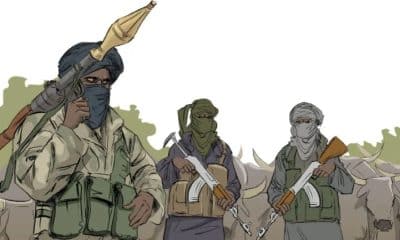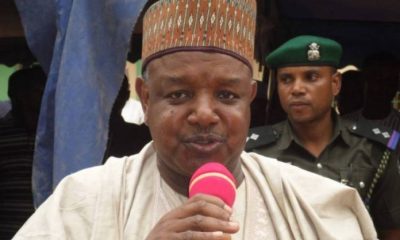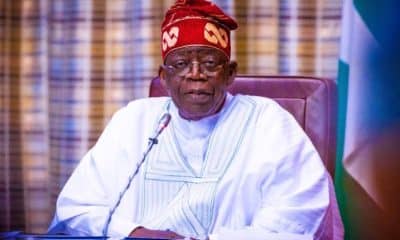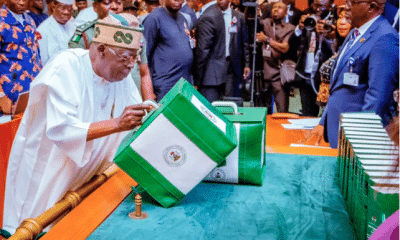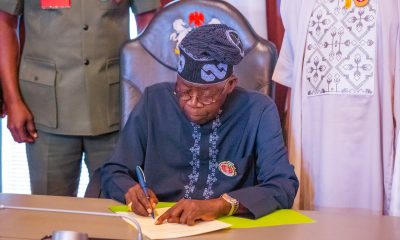Nigeria News
EFCC: Corruption, Nepotism, Blackmail Rocks Nigeria’s Anti-Corruption Agency
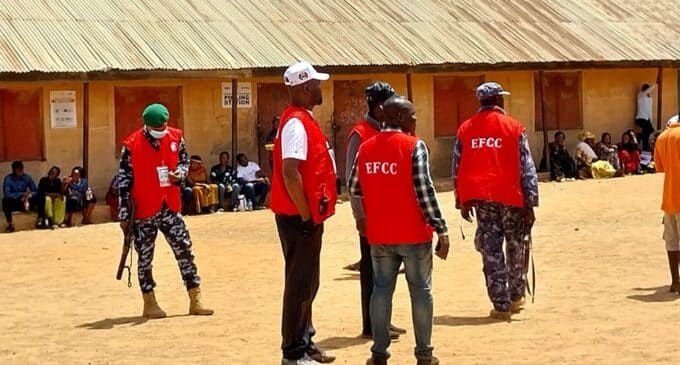
Shocking allegations of corruption, promotion racketeering, tribal bigotry resulting in the elevation of persons from a particular region is currently rocking the Economic and Financial Crimes Commission (EFCC).
According to an investigation by Daily Independent, sources have revealed corruption in the disposal of assets and proceeds of crime seized by EFCC, fingering the Office of the Attorney General of the Federation and Minister of Justice in the sleaze.
The officers alleged that the leadership of the commission ran an extortionate regime made possible by institutionalised nepotism.
Governors, some officers said, were blackmailed into paying hefty sums in hard currencies. One instance was given of a former South-East governor, who was made to part with $6 million of late.
A source said the emergence of EFCC chairmen was skewed to favour a particular section of the country, saying, “We are running an institutionalised apartheid system in this agency,” adding that the chairmen were put in the office at the expense of more experienced professionals who are their seniors.
The biggest indication of the ongoing schisms happening in EFCC are in an open letter to President Bola Tinubu, written by a group that identified itself as ‘Progressive Nigerians’, and a copy of which was made available to this newspaper.
Daily Independent investigation revealed that officers in four operational zones of the EFCC in Port Harcourt, Benin, Ibadan and Ilorin are aware of the publication and even offered further insights on the matters raised therein when contacted while some others made attempt to make light of the allegations in the petition.
Officially, the EFCC refused to speak on the matter when contacted on several levels to shed light on what the matter is all about.
But for the skewed system favouring a section of the country, according to the petitioners, Abdulrasheed Bawa’s exit should have paved way for the most senior director in EFCC and not Abdulkarim Chukkol as the presidential directive to the commission instructed.
President Tinubu’s directive to EFCC effecting the suspension of Bawa also provided that mantle of leadership be handed over to the most senior officer.
Rather than Chukkol, the most senior in EFCC at present is Ayo Olowonihi, a very senior director currently in charge of the commission’s training academy.
Olowonihi, according to Independent’s findings, is currently the most senior director in the entire hierarchy of the EFCC. As learnt, he is a seasoned investigator, a pioneer staff of the commission who transferred service from the National Drug Law Enforcement Agency (NDLEA), and with over 33 years’ experience tucked under his belt. He is reputed to have trained every other investigator in the EFCC including Bawa and the current acting chairman.
There is another one, Chile Okoroma, a lawyer, who has offered prosecutorial services to the commission since its creation. There are also Olatona, Johnson Ojogbaine, Rotimi Oyedepo (SAN), and many others.
Globally, it had become incumbent on nations desiring foreign investors to look in to set up anti-financial crime infrastructure. Illicit money flows, believe global financial crime fighters, are principal finances that fuel terrorism, banditry and drug related offences.
So Nigeria, in 2003/2004, urgently needed good hands for the newly founded EFCC at the time to be taken off watch lists of countries not compliant with financial transparency. So, some staff were sourced from other sister security agencies mostly on secondment. That was why there were many police personnel from the Nigeria Police Force.
There were also recruitments from security and administrative personnel from offices like the DSS, NIA, NDLEA, Head of Service, and even Ministry of Foreign Affairs.
This exercise brought in Olowonihi, who came in as a permanent staff from NDLEA. Some new staff, especially lawyers, were recruited on fresh appointment to handle prosecution of cases in court. This was the exercise that brought in the likes of Okoroma.
But between 2004 and 2005, the commission created its own cadet corps, introduced by Nuhu Ribadu, a former chairman. The Senior Course One of that exercise came in only later after many lawyers were recruited. The likes of Bawa and current acting chairman, Abdulkarim Chukkol, came in through that cadet exercise. The course is essentially rudimentary in weapons handling, marching regimentation of force related trainings. Financial crimes being not necessarily a violent crime, the weapons and use of force aspect of their trainings rarely comes handy, say officers interviewed by Daily Independent.
Those who spoke to Daily Independent insisted that more than 80 percent of the current cadet trained officers in the EFCC are especially from the North-East of the country.
“This has resulted in Hausa language becoming almost official language used in the commission to conduct business,” said an operative.
As also gathered, one officer was demoted for protesting over the matter.
The emergence of Bawa as chairman of the commission, according to the petition, was a “rape” on the EFCC Establishment Act.
According to the petitioners, an impression has been created in the outside world that the Office of the Directorate of Operations (DOP) is next to the office of EFCC chairman. To that effect, when the chairman is removed hurriedly, whomever headed the DOP is lined up to take charge as the next chairman as Chukkol was and now as Muktar is now slated to be.
A large swath of insiders in EFCC, especially the lawyer corps, contest the legality of such arrangement.
Going by EFCC Establishment Act of 2004, there was nowhere DOP was created as a department or unit. In fact, findings show that the few offices created by the Act are offices of the Executive Chairman, Secretary to the Commission, General and Assets Investigation Units, Legal and Prosecution Unit, as specifically pointed out in Sections 8(1)(2) (3) up to 13(1)(2)(a) of the EFCC Act of 2004.
“Ordinarily, EFCC was created to be a legal ‘depot’ and lawyers’ jurisdiction. Its leadership was designed to involve people with the knowledge of the law running its affairs.
“This was why the Office of the Secretary to the Commission was created to be strictly headed by a lawyer who should ordinarily take charge in both administration and operation in the event that the executive chairman cannot discharge the responsibilities of his office.”
After the emergence of Tinubu as President, it was learnt that a flurry of promotion spree went on, favouring just the same section of the country again. Chukkol, it was said, is a beneficiary.
Until two months ago, Chukkol was on Grade Level 14. But got multiple promotion to the position of director. Hadiza Gamawa, Bawa’s Chief of Staff, was also promoted from GL 14 to 17 as a director. There were also allegations that the promotions were accelerated without benefit of any exams or test.
“The promotion was rushed in anticipation of Bawa’s exit so as to allow Chukkol or anyone so hurriedly promoted to stay so in those positions,” the open letter to President Tinubu said.
The inconsistencies trickles into the operation of EFCC’s zonal operations. At the zones you could have the zonal head lower in ranking to some staff within the jurisdiction.
Most of the zonal commanders are junior to the lawyers that are posted there as Head of Legal Unit. Head of Legal in these Zonal Offices are mostly on GL 16 while the Zonal Commanders are on GL 14.
The newspaper found example of this in Ibadan where the Zonal Commander, Halima Abubakar, Assistant Commander, EFCC, ACE1, GL 15, but the head of legal under her, KMA Olusesi is Deputy Commander, EFCC, DCE, GL 16. The DCE is higher in ranking than ACE.
In Port Harcourt, Hamed Ghali, is ACE1 GL 15 while the Head of Legal is Ben Ubi, DCE, GL 16; in Lagos, its Michael Wetkas. Like that of Ibadan, he is ACE 15 while his legal officer is Latona Kabir, DCE GL 16; Gombe Suleiman Nahaba, ACE 1 GL 15. But his officer in charge of legal is Festus Ojo, also DCE GL 16. In Ilorin, Michael Nzekwe is an ACE 1, GL 15. But head of legal in the zone is ABC Ezioko, DCE GL 16.
In the past, there have been efforts to create balance in the commission to afford all staff equal opportunities.
Daily Independent learnt of the abortive experiment under Farida Waziri, the woman who took over from Ribadu.
In an attempt to remove disparity between the cadets trained officers and other regular employees of the commission, she created a Senior Course 4. She borrowed the idea from NDLEA under its pioneer chairman, the late Musa Bamaiyi, who created a six months course where all eligible officers were trained to remove disparity in the drug law enforcement agency at the time.
Waziri had all senior staff of the EFCC undergo the Course 4 training. As learnt, the move did not go down well with cadet trained officers. When Farida left, inside sources said no one dared mention the programme.
“And you dare not mention Course 4 in EFCC today because the authorities will pounce on you and make you feel that you have committed treason.
“Even Wilson Uwujaren and senior media officers of the EFCC took the course which ordinarily makes them eligible to head the commission. Have you asked them about it,” queried the source..

